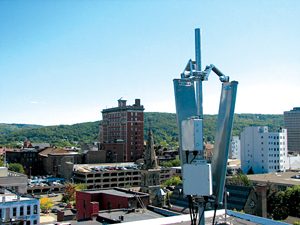
Binghamton city officials hope that greater numbers of students will be drawn Downtown as they learn more about the free Wi-Fi network setup, which has attracted double the number of users since its initiation last spring.
The Wi-Fi system was first set up last March with moderate success — the first numbers in April showed that over 5,000 people had logged on to the Internet through the network. Six months later, logins have spiked to just around 10,000.
“People are using the service, we’ve had an 88 percent increase in service since it began,” said Andrew Block, director of community relations for the city of Binghamton. “We know we can do even better.”
Binghamton Wi-Fi is a partnership between the city and Plexicomm, LLC, an Internet solutions company that handles all the technical service and questions. The program is a two-year contract which costs $3,650 a month for the city, half of which is paid through a state grant for the first year.
“We are in the middle of getting a contract to sell advertising through the Wi-Fi,” said Philip K. Grommet of the Binghamton Economic Development Office. “The ad revenue will hopefully pay for most of the system, but it’s an investment the city is happy to make.”
While the return of students to Binghamton University is part of the reason for the increase in users over the past six months, the number of logins actually began to jump in June.
“We’ve gotten a lot of feedback from the residents, and service is functioning well,” Grommet said.
The Wi-Fi system has over 20 rooftop access points around the Downtown area and users can access the Internet in the line of sight of these points. Residents who don’t have line of sight to these access points have the option of buying a repeater for a one-time cost of $199. A repeater is a device that can pick up and extend the wireless signal, extending the signal’s range into buildings that it would otherwise not reach.
Landlords have been encouraged to buy these repeaters because officials know it is an amenity that students would definitely utilize.
Over the past six months officials have been monitoring and collecting data, and making changes to make the system even more effective.
“We can find which are the highest access points and we want to make sure the signal works best in those areas,” Grommet said.
To increase the effectiveness of the Wi-Fi, specifically in the areas around Court, Washington and State Streets, street level access points have been placed to improve line of sight. There are also many businesses which have repeaters for customers to use, including Java Joe’s and Dillinger’s.
The introduction of the free Wi-Fi is an attempt to further the betterment of the Downtown area.
“Binghamton Wi-Fi is one more step to making Binghamton a better place to visit, live and do business,” said Grommet.
When logging on to the Wi-Fi, there will be a 15-second video of public service announcements, aimed at getting the public aware of what is going on Downtown. These announcements will also be available for student groups holding programs Downtown.
Graduate students who aided in researching the application of a Wi-Fi system in Binghamton found that it would be better to have a smaller, focused area receiving the network.
“We’re taking the necessary steps to put in a system that will be fiscally responsible,” Grommet said.
City officials are very excited to have the new system up and working, with good feedback from the residents.
“Not a lot of communities have a local, free Wi-Fi service,” Block said. “It sets Binghamton apart from the rest.”


